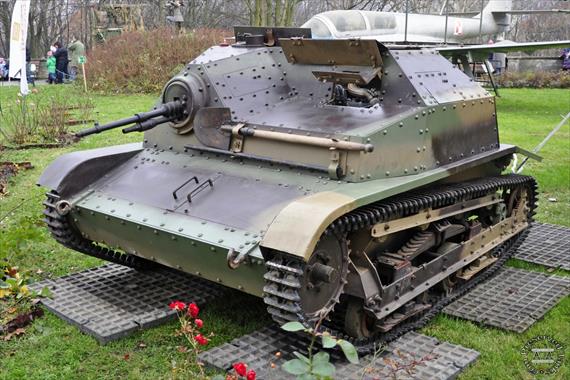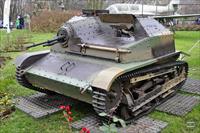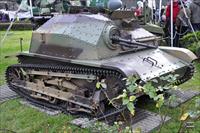MAP CONTROLS: Use slider or mousewheel to zoom, and hold down left mouse button
to drag.
KEY: Location markers are coloured from Green meaning exact to Red meaning
gone or unknown (details here)

|
|
Unique ID:
|
2229
|
|
Added to Database:
|
7 April 2012
|
|
Last Edited:
|
8 April 2012
|
|
Type (ID):
|
TKS (16150)
|
|
Model (ID):
|
TKS (16150)
|
|
Location Category (ID):
|
Muzeum Wojska Polskiego (16010)
|
|
Location (ID):
|
Museum Building (16011)
|
|
Serial Number: |
|
|
Registration: |
|
|
Name: |
|
|
Other Identification: |
Painted overall in a brown, green and sand camouflage scheme.
|
|
Collection Reference: |
|
|
Links: |
PIBWL
Portal Militarno
Before Restoration – Pansarmuseet
|
|
References: |
|
|
Associated Tanks: |
|
Location History:
(see map) |
1: Panstwowe Zaklady Inzynieryjne, Ursus, Warsaw, Mazowieckie, Poland (Design parent and sole manufacturer 1934-9)
2: Unknown Location, Norway (From about 1945)
3: Pansarmuseet, Axvall, Sweden (Until November 2003)
4: Muzeum Wojska Polskiego, Powiśle, Warsaw, Mazowieckie, Poland (Current location)
5: Kielce, Poland (MSPO September 2005)
6: Muzeum Wojska Polskiego, Powiśle, Warsaw, Mazowieckie, Poland (Current location)
7: Fort IX Czerniaków, Mokotów, Warsaw, Mazowieckie, Poland (September 2005)
8: Muzeum Wojska Polskiego, Powiśle, Warsaw, Mazowieckie, Poland (Current location)
9: Muzeum Ziemi Sochaczewskiej i Pola Bitwy nad Bzura, Sochaczew, Sochaczewski, Mazowieckie, Poland (Not the museum but Bzura Battle re-enactment 2005)
10: Muzeum Wojska Polskiego, Powiśle, Warsaw, Mazowieckie, Poland (Current location)
|
Text in original Preserved Polish Tanks publication:
[No entry]
Text in Preserved Polish Tanks Update:
[No entry]
Text in original Preserved Tanks In Poland publication:
This TKS was captured by the Germans during the Second World War and taken to Norway to serve with the occupation forces. It was found in the Swedish Axvall Pansarmuseet (chassis and part of upper plates) and was donated in November 2003 to the Polish Army Museum. It was completely restored by the museum and the Ursus factory, with parts coming from different tankettes found in the ground and some parts reconstructed. It is painted in a standard camouflage scheme used by the Polish from 1936 into World War II. Its first public show was at the International Defence Industry Salon (MSPO) in September 2005 in Kielce, followed by a technical demonstration also in September 2005 at Fort Czerniakowski. It also took part in the Bzura 2005 historical re-enactment. (Source: PIBWL, Portal Militarno).
It is in good condition and in running order, but is missing some interior parts.
|
November 2010
|
| | | |  | | | | |
1: Front left view, photo by Wistula
Taken: 11 November 2010
Contributor: Wikimedia
Photo ID: 7296
Added: 7 April 2012
Filename: DSC1353_...
Views: 342
Select/Has Priority: 21/0
|
|
|
|
| | | |  | | | | |
2: Front right view, photo by Wistula
Taken: 11 November 2010
Contributor: Wikimedia
Photo ID: 7297
Added: 7 April 2012
Filename: DSC1356_...
Views: 346
Select/Has Priority: 21/0
|
| | | |
|
|